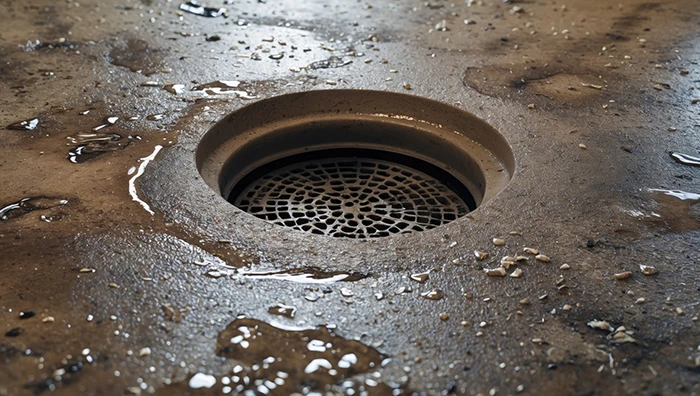Floor drains are easy to forget until there’s a problem. Before they become one, make sure commercial floor drain maintenance is part of your facility maintenance routine.
Commercial Floor Drain Maintenance: Why Do It?
Commercial floor drain maintenance involves more than just ensuring it’s not clogged. Even though they’re important, most people tend to overlook them when they manage wastewater, runoff, and sanitation in buildings. Most people use these drains more often than they notice them. Given their purpose, drains are usually exposed to anything from dirt and debris to chemical cleaners.
You may encounter numerous setbacks if you fail to maintain your floor drains. If it clogs, water can pool and back up. This usually results in foul smells as bacteria in the undrained water spread.
On the contrary, if you keep on top of it, you can avoid any emergencies coming from it and save money from possible further damages that you are preventing.
Common Problems Caused by Neglected Drains
Ignoring floor drains may not cause issues overnight, but when they do show up, they tend to be expensive and disruptive.
Here’s what can happen when commercial floor drain maintenance gets pushed aside:
Foul Odors
Other than being a pathway for wastewater to flow through, drains also serve as a barrier to the sewage system. If you neglect them long enough, the water in its trap seal dries up. This removes the barrier that blocks sewer gases from spreading inside the facility.
Slow Drainage or Water Backup
On the other hand, you can also neglect drains enough that they become clogged. Dirt, grease, and waste tend to build up in the drain line, especially if you don’t clean it out. Over time, that can result in slow drainage or complete clogging.
Health Risks
Most organisms thrive in moisture, and stagnant water pooling due to clogged drains can become a breeding ground for bacteria and pests.
Water Damage
A clogged floor drain can lead to water pooling or overflowing indoors. That moisture can damage flooring, walls, or equipment and might require costly remediation.
Identify Dry Drains in a Commercial Facility
A commercial facility dry drain typically occurs when a floor drain isn’t used regularly, and the water in the trap seal evaporates. The result? An open path for sewer gases to enter the building.
Here’s how you can tell if a drain has gone dry:
- Smelling a strong, sewage-like odor in the vicinity of the drain
- A visible buildup of dust or debris inside the drain
- Finding no visible water in the drain trap
- Complaints from building occupants about smells or headaches
Luckily, you can easily prevent this issue with a regular maintenance routine.
Best Practices for Commercial Floor Drain Maintenance

Maintaining floor drains doesn’t require a large budget, just consistency and awareness. Here are the best practices every commercial facility manager should follow:
Having a Proper Maintenance Schedule
Create a schedule for monthly inspections and routine flushing. High-traffic areas or food-service locations may require weekly checks.
Pour Water Regularly
For drains that aren’t used often, pour a gallon of clean water into the drain every few weeks to refill the trap seal. This simple task can prevent odors and sewer gas entry.
Use Drain Sealing Devices
Consider installing trap primers or commercial facility trap seals to help keep water in the drain. These products reduce evaporation and provide a long-lasting barrier against sewer gases.
Clear Debris and Sludge
Remove visible debris from the drain opening. For deeper cleaning, use a wet/dry vacuum or a non-corrosive drain cleaner that’s safe for your pipes.
Schedule Professional Inspections
Have a licensed plumber or facility maintenance team inspect the system regularly. Professional camera inspections can detect hidden blockages, root intrusion, or pipe corrosion.
Tips for Preventing Odors in Floor Drains
Odors from floor drains are one of the most common complaints from commercial building occupants. Here’s how to keep those smells in check:
- Refill trap seals regularly with water or a commercial drain trap liquid
- Use enzyme-based cleaners instead of bleach (bleach can kill beneficial bacteria)
- Avoid pouring grease, fats, or solids down the drain
- Ventilate the room to reduce lingering odors and moisture
- Install odor-locking covers on problem drains
Special Considerations for Commercial Kitchens and Janitorial Areas
Not all drains are used the same way. Some areas need extra attention:
Commercial Kitchens
Drains in kitchens are more likely to encounter grease, food scraps, and acidic cleaning agents. These drains clog easily if grease traps aren’t maintained or if oils are dumped directly into the drain. Consider scheduling quarterly cleanouts with a professional service.
Janitorial Closets
Janitorial floor drains often sit unused for weeks. Because these drains are designed to handle mop water and cleaning chemicals, evaporation happens faster than you’d expect. Mark these drains for regular flushing and refilling.
The Role of Commercial Facility Trap Seals
Trap seals are your first line of defense against dry drains and odors. A trap seal is a water barrier inside the drain that prevents sewer gases from rising into the building.
Over time, that water can evaporate, especially in hot or dry environments. That’s where commercial facility trap seals come in.
Modern trap seals use flexible membranes or check valves to retain water or block gas, even if the water level drops. They’re instrumental in drains that don’t get frequent use. Installing these can reduce odor complaints and extend the time between manual refills.
If your building doesn’t already use them, it’s worth discussing with your plumbing maintenance team.
What to Do When You Suspect a Drain Problem
Acting fast can prevent a minor issue from becoming a costly repair. If you notice odors, slow drainage, or visible buildup:
- Flush the drain with water
- Add a trap primer or drain sealing product
- Call a professional if the issue persists
It’s also helpful to document issues and resolutions. Keeping track of when a problem started and what was done can help with future troubleshooting and prevent repeat issues.
Why HOAs and Facility Managers Should Prioritize This

For HOA board members and commercial property managers, neglecting floor drain maintenance can lead to tenant complaints, code violations, and repair costs.
A poorly maintained drain system can impact the whole building. And when odors or water damage reach common areas, it reflects poorly on community management.
Here’s what proactive managers do:
- Include floor drain checks in regular building walk-throughs
- Train maintenance staff on the signs of dry drains
- Budget for occasional professional inspections
- Communicate with tenants about reporting strange odors or slow drainage
Simple Tools That Make a Big Difference
You don’t need complex equipment to stay on top of commercial floor drain maintenance. A few low-cost items can go a long way:
- Drain covers: Help reduce debris buildup
- Enzyme-based cleaners: Safe for pipes and environmentally friendly
- Trap seal primers: Keep traps from drying out
- Maintenance logs: Track inspections and problem areas
- Flashlights and mirrors: Useful for quick drain inspections
These tools help your team stay ahead of the problem rather than react to emergencies.
Keeping Drains Clear
Overlooking commercial floor drain maintenance might not seem urgent until it’s too late. If you want to keep your facility cleaner, safer, and better protected from avoidable repair bills, this part of your building is something you shouldn’t neglect.
Maintenance Specialists Inc. offers a wide range of commercial property maintenance services. Call us now at 704.405.6000 or contact us online for more details!
Related Articles:

